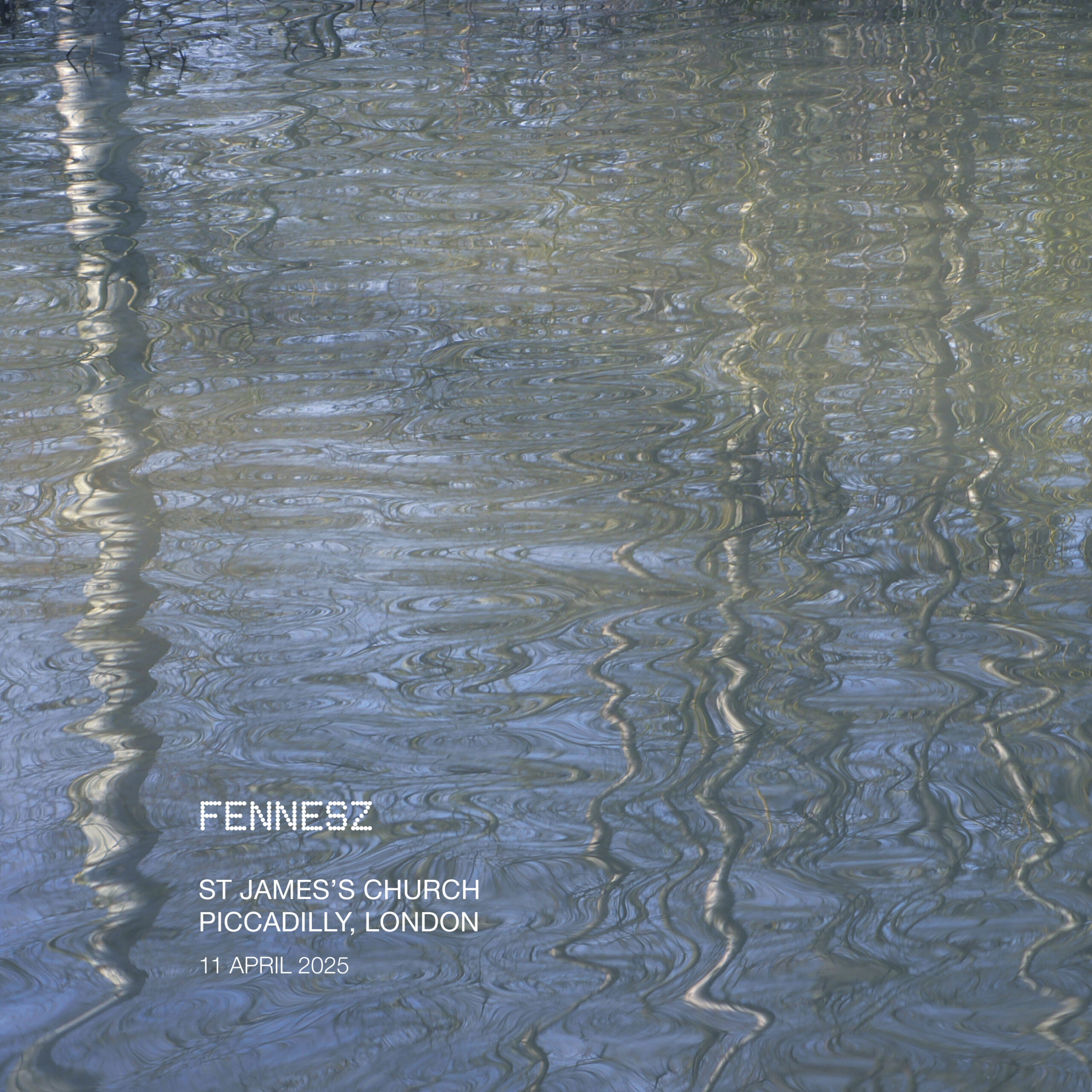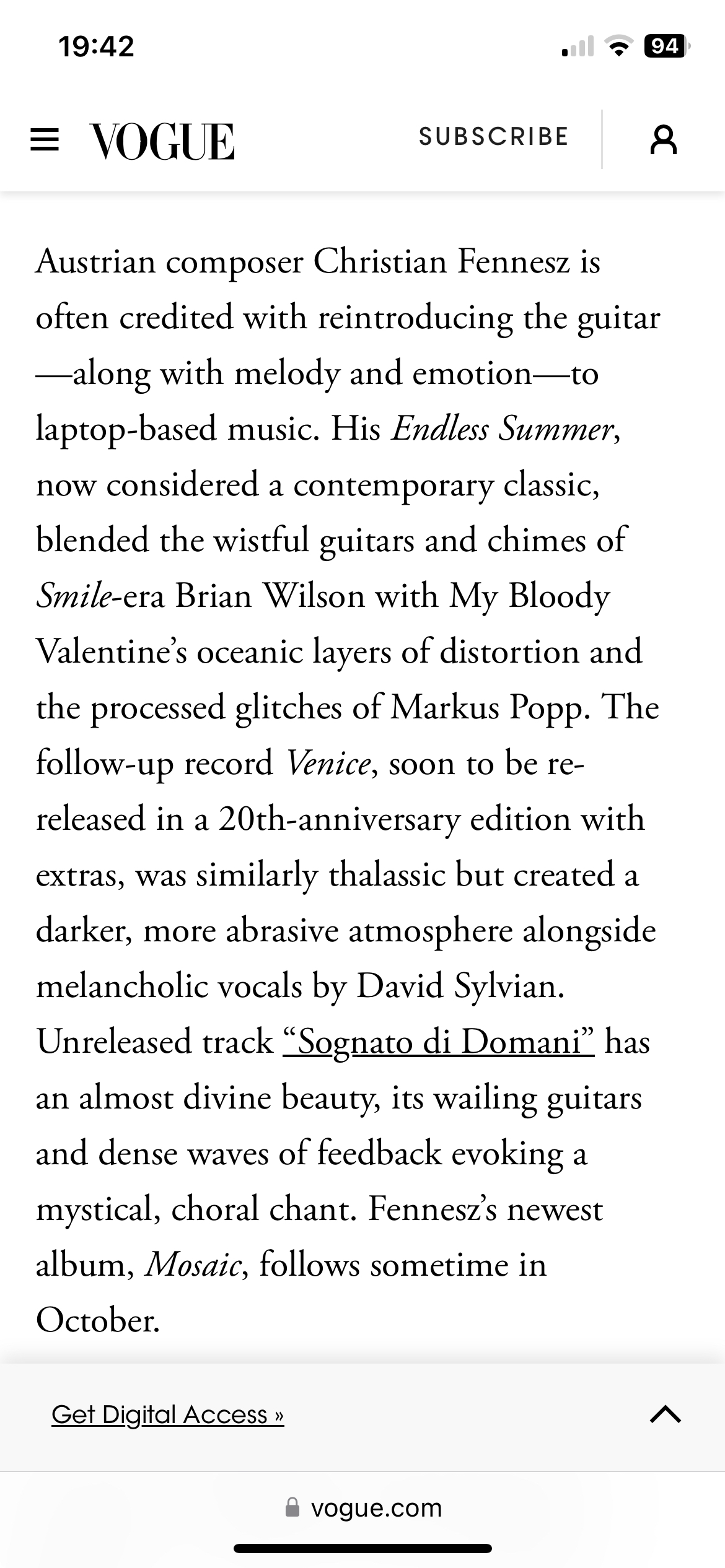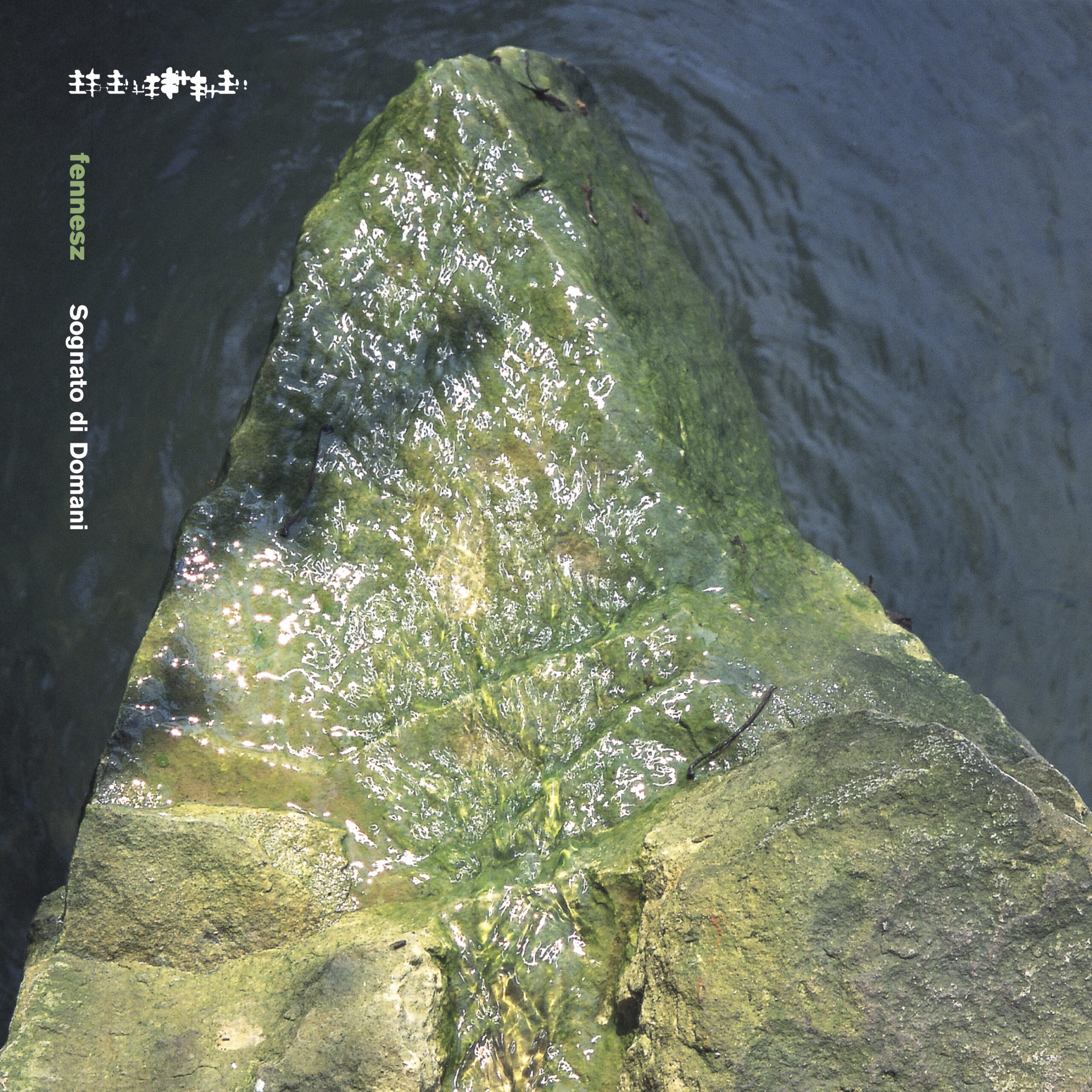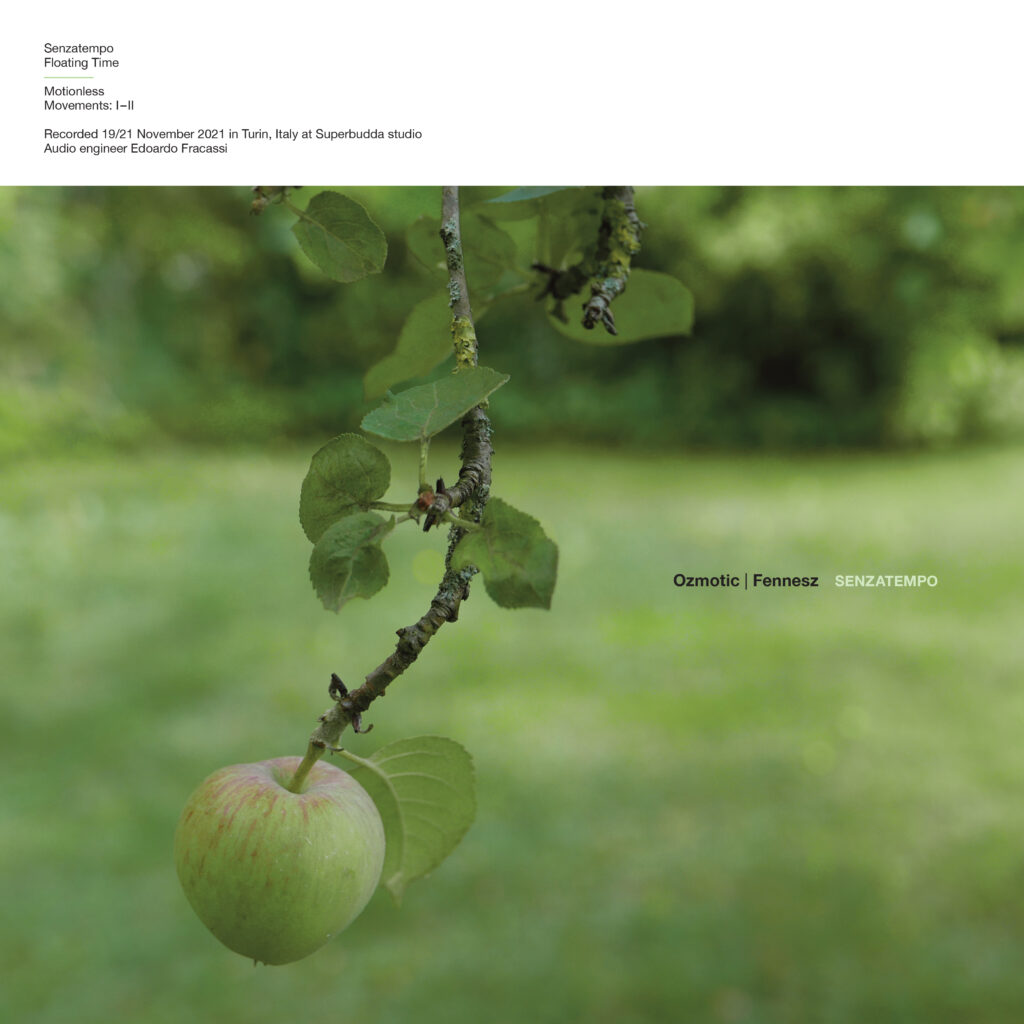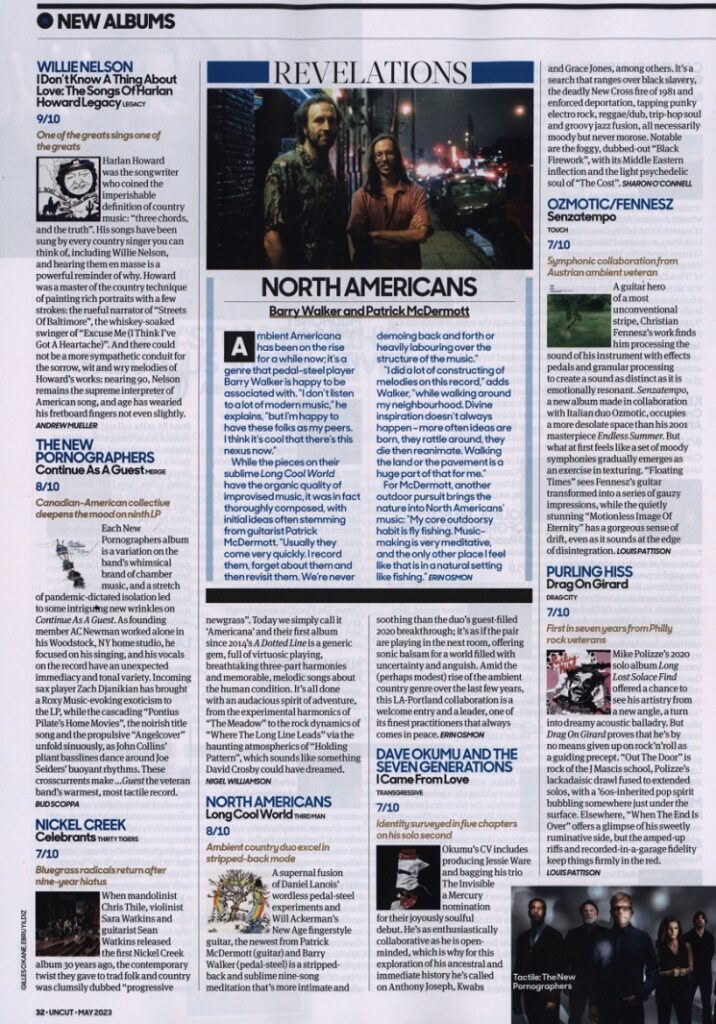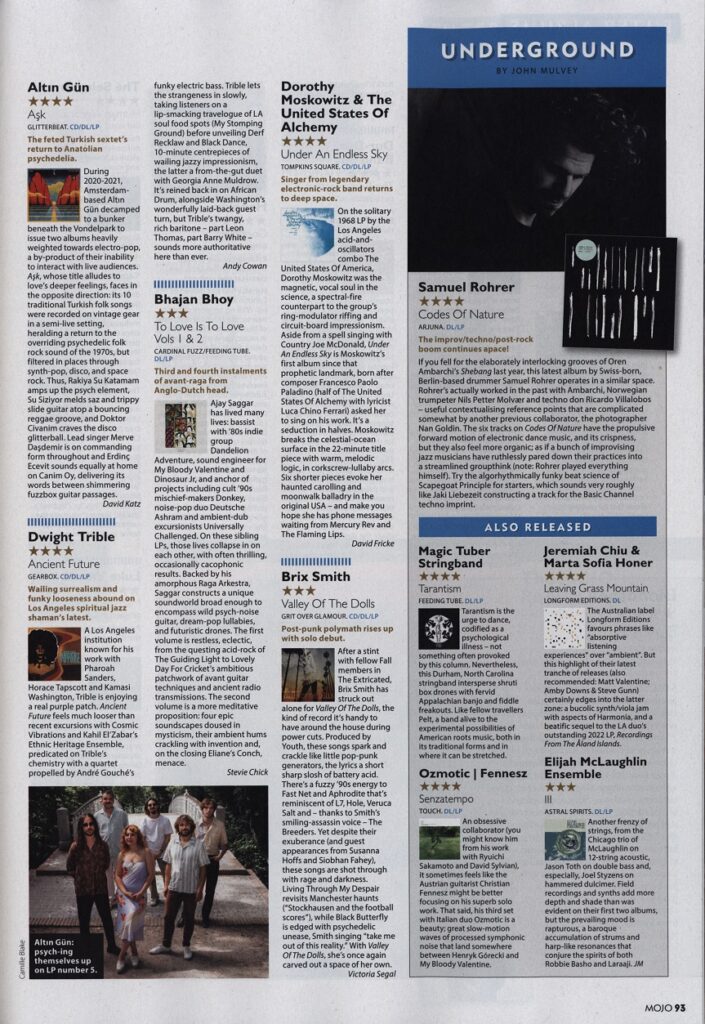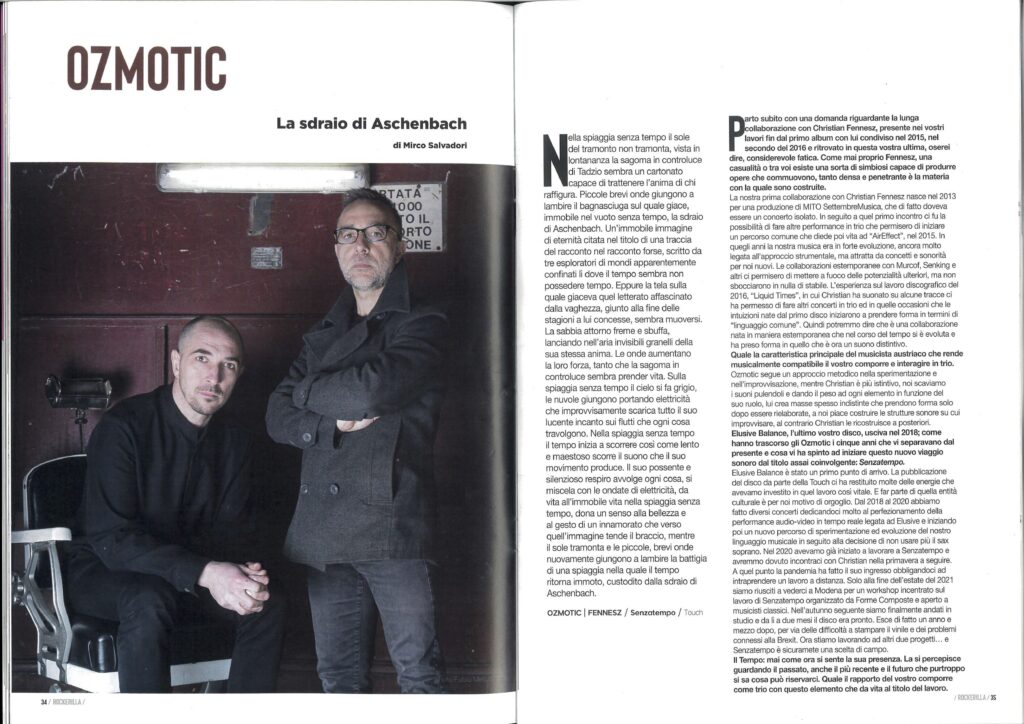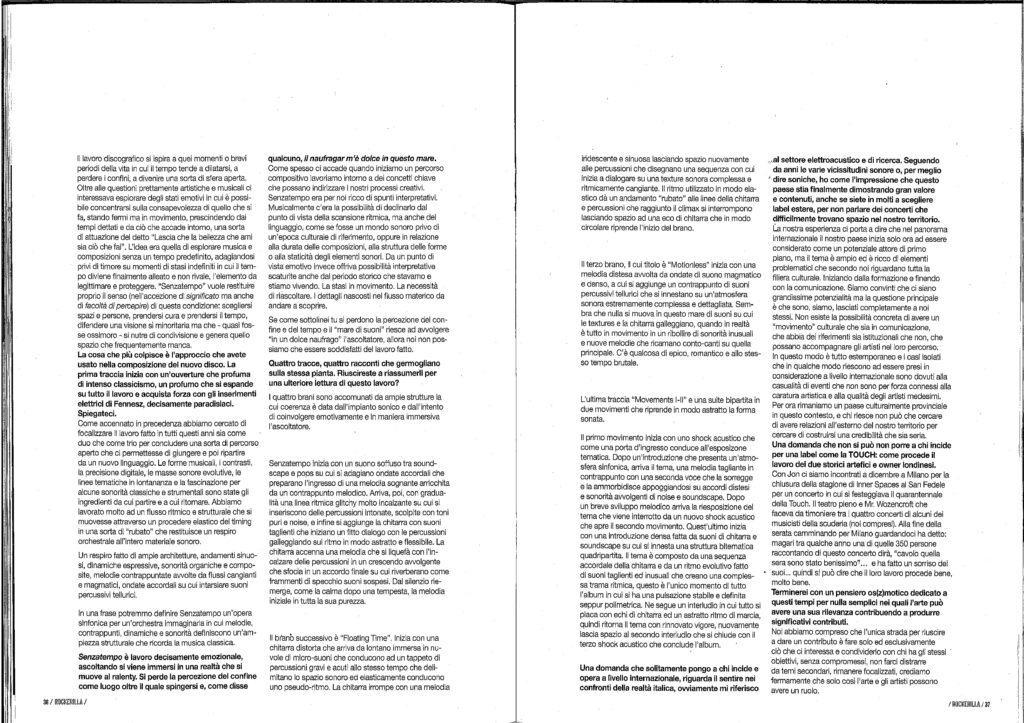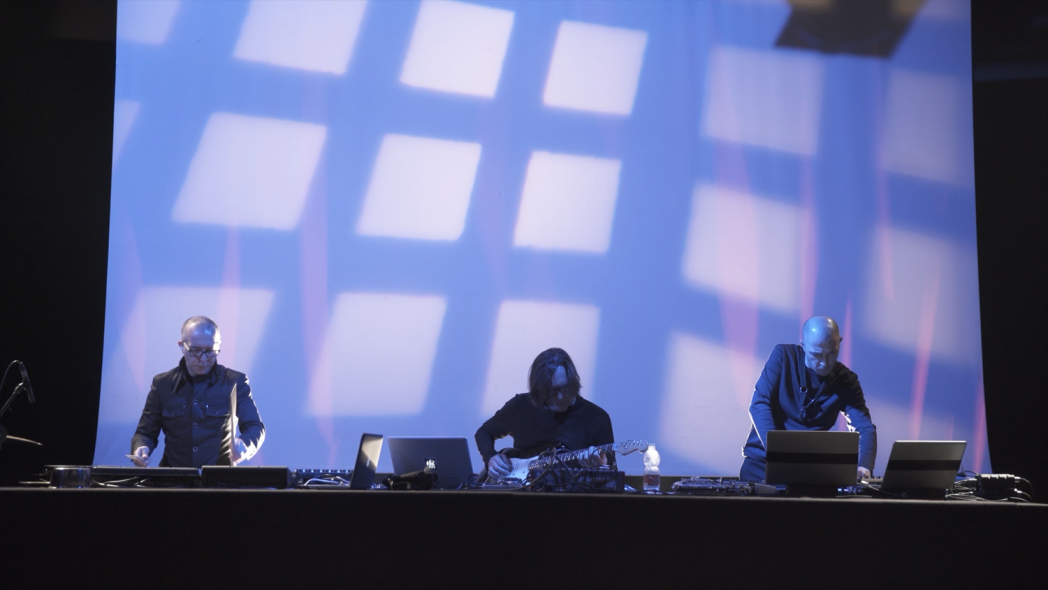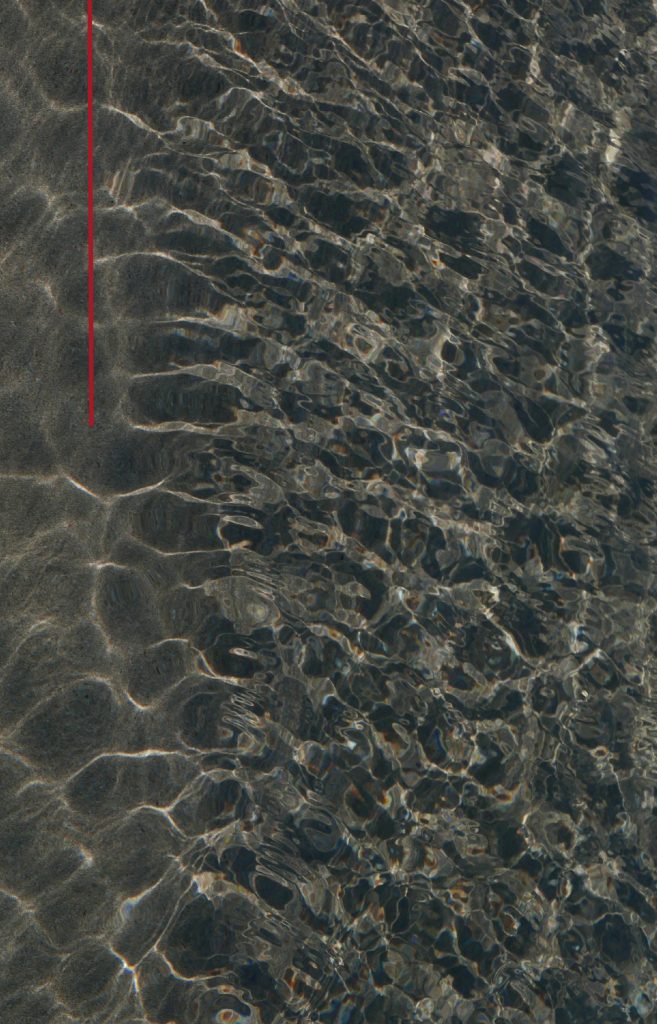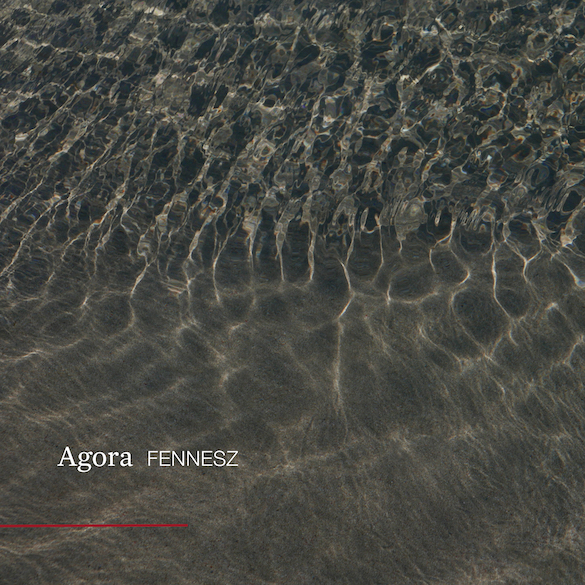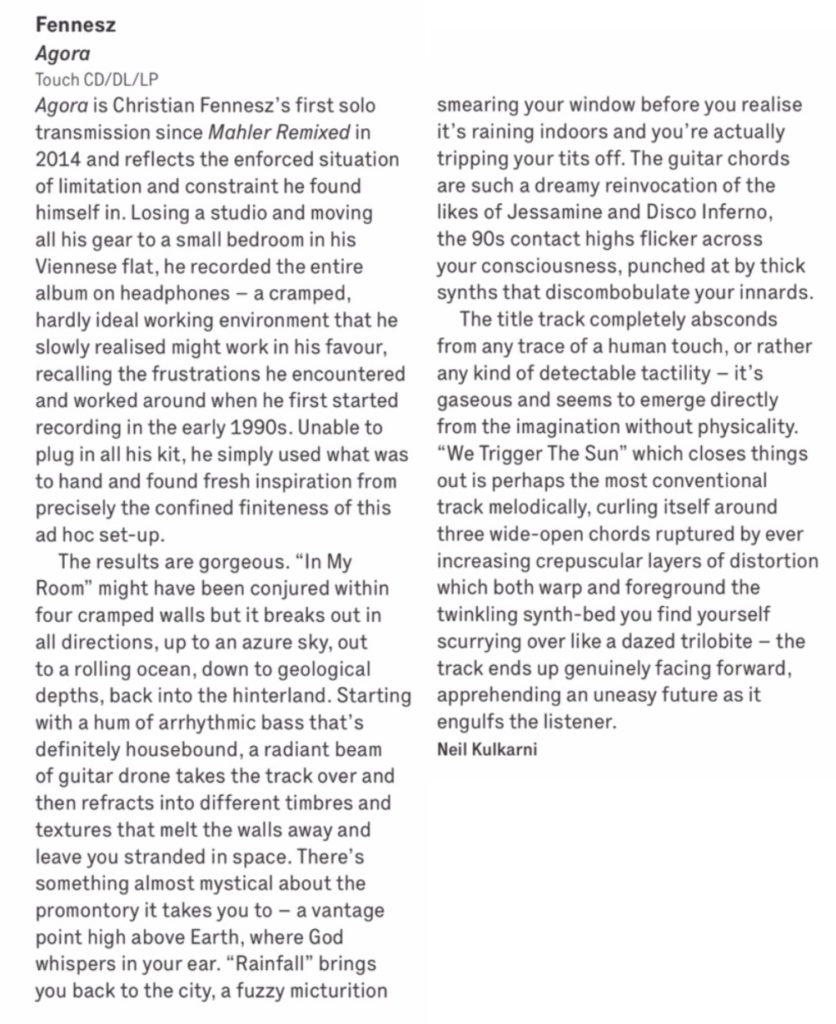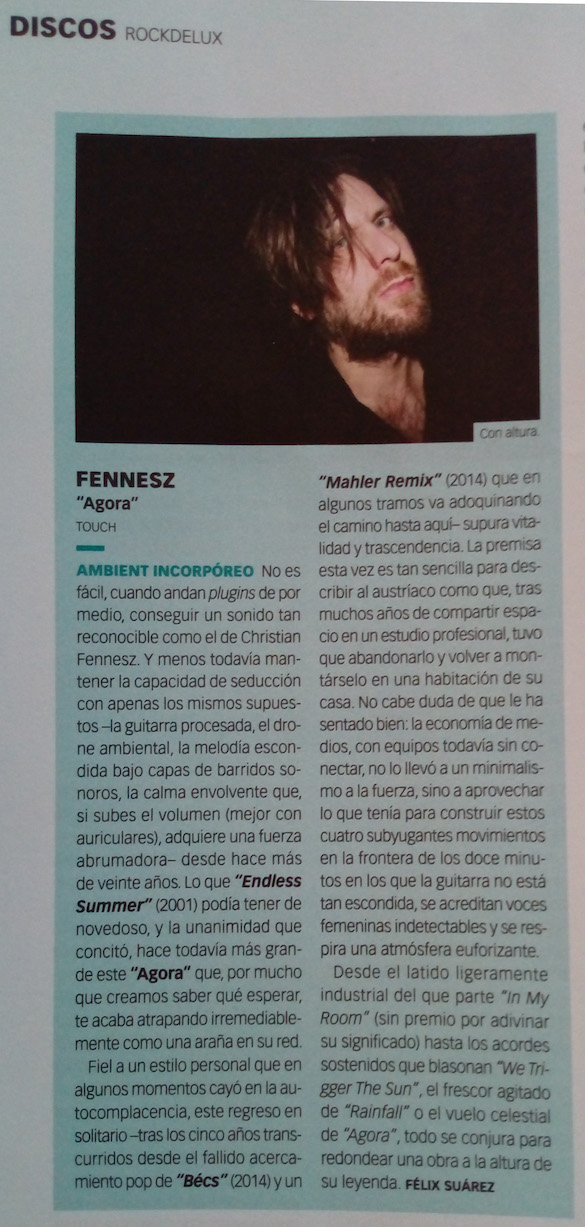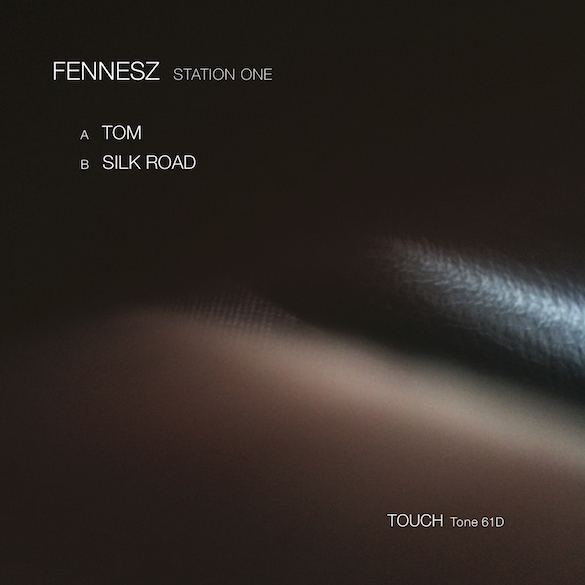Available to order now on bandcamp
Release date: 6th December 2024
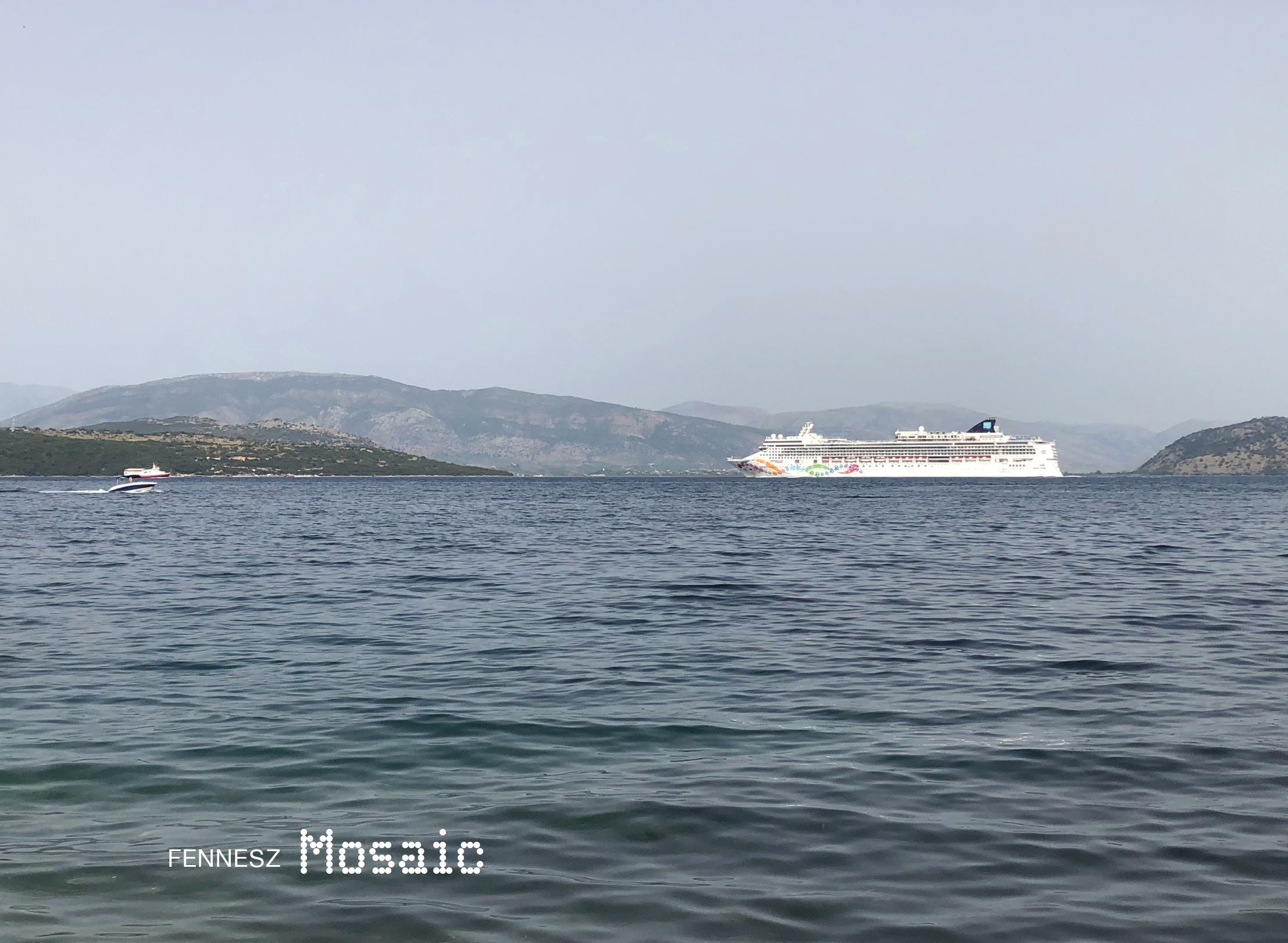
Track Listing: [CD – 6 tracks]
1. Heliconia
2. Love and the Framed Insects
3. Personare
4. A Man Outside
5. Patterning Heart
6. Goniorizon
This is Fennesz’s most reflective album to date. Composed and recorded at the end of 2023 and completed in the summer of 2024. Fennesz set up a new studio space, the third one in four years. He had no immediate concept, this time starting from scratch, with a strict working routine. He got up early in the morning, worked until midday then had a break and worked again until evening. At first, just collecting ideas, experimenting, improvising. Then composing, mixing and correcting. Yet the title came early, ‘Mosaic’, which mirrored this process of putting an element into place one at a time to build the full picture, an ancient technique of making an image, before pixels did it in a flash.
This ‘9 to 5′ working routine had already been developed on ‘Agora’ [Touch 2019]. All the other albums before were done differently; a few weeks work, then months in between and another few days or weeks of work. ‘Mosaic’ was done from beginning to end without a break.
Packaged in the now familiar DVD-style case with artwork and photography by Jon Wozencroft, there is an echo to ‘Venice’ but 20 years later the division between the land, the horizon and the deep blue sea is more extreme.
Fennesz experiments with unusual time signatures. It’s not obvious, but ‘Love and the Framed Insects’ is in 7/4. ‘Personare’ is somehow influenced by West African pop music from the 1980s. ‘Goniorizon’ originally consisted of six hard rock guitar riffs mixed on top of one another. Then it became this ‘thing’ that somehow opened possibilities for new things to come… all this adds up to a filmic, highly involving and beautiful score of diverse influences and multiple possibilities to be explored by the listener.
Recorded by Christian Fennesz at Seven Fountains/Vienna between January and May 2024
Mastered by Denis Blackham
Photography & design by Jon Wozencroft
Published by Touch Music/Fairwood Music (UK) Ltd
For more information, you can visit his website here
Reviews:
Fennesz and the Meaning of Ambient Music – Feature in Hearing Things, December 2024 by Mark Richardson
The Quietus, December 2024 by Levi Dayan
CHAIN D.L.K. (net):
5/5
Fennesz’s “Mosaic” is an album as delicate and intricate as its name suggests, piecing together sonic fragments into something vast and immersive. Created with a meticulous, almost meditative process, Fennesz assembled this work layer by layer, as if restoring a forgotten memory or constructing a sonic monument.
There’s irony in its mechanical working routine – the “9 to 5” approach – because “Mosaic” feels anything but formulaic. It breathes in moments of improvisation, taking unpredictable turns. The album’s opener, “Heliconia,” drifts in with a weightless, crystalline shimmer, setting the mood for a meditative yet dynamic sonic exploration. Then there’s “Love and the Framed Insects” in 7/4 time – a rhythmic decision that nods to his knack for subverting expectations, presenting complexity as subtlety. The West African influences on “Personare” are yet another twist, drawing connections between distant musical worlds.
What makes “Mosaic” stand apart from Fennesz’s earlier works – like “Agora” or even “Venice” – is its sense of maturity, a reflective patience. Here, time moves differently. Each track feels like an architectural structure in sound, designed with careful precision,but imbued with an organic pulse. The guitar textures, always a hallmark of Fennesz’s sound, are present but seem more submerged, part of the overall collage rather than the focal point. Take “Goniorizon” for instance: originally built from hard rock riffs, it somehow transforms into something cinematic, a constantly shifting soundscape of fractured beauty.
The beauty of “Mosaic” lies in its contradictions. It is, on one hand, a highly intellectual project built through methodical experimentation with time signatures and structures. Yet it feels deeply emotional, even mystical – an invitation to explore hidden spaces, to hear the whispers of sound ghosts hiding in its layers. The album title echoes this balance: a mosaic is both a constructed image and an organic whole, each piece significant yet incomplete without the others.
With “Mosaic”, Fennesz once again proves he’s not just a musician but a sonic architect, crafting worlds for us to inhabit, even if only for a moment before they dissolve into the ether. It’s an album where science meets dream, precision meets poetry, and sound itself becomes an ancient language we’re invited to rediscover. A real jewel! [Vita Camarretta]
MOJO (UK):

Juno Records (UK):
Christian Fennesz returns with Mosaic, an intricate album that lives up to its name, crafted meticulously layer by layer. Recorded throughout 2023 and completed in 2024, the project marks Fennesz’s most reflective work yet. After setting up a new studio, his third in four years, Fennesz followed a disciplined daily routine, building the album from scratch without breaks. This structured approach allowed him to experiment freely, collecting and improvising ideas before developing them into fully composed pieces.The Touch label is natural home for this release. Some of his most important work has found its way to the label over the past 25 years like 2004’s Venice and 2001’s Endless Summer. Mosaic s has a delicate assembly of sonic fragments, creating a soundscape both complex and organic. The opener, ‘Heliconia’, introduces shimmering tones that float effortlessly, establishing a meditative atmosphere. Fennesz’s unique approach to rhythm shines through on tracks like ‘Love and the Framed Insects’, which features an unconventional 7/4 time signature. Meanwhile, ‘Personare’ draws subtle inspiration from 1980s West African pop, a surprising influence that adds depth to the album’s palette. One of the album’s most intriguing pieces, ‘Goniorizon’, began with layers of hard rock guitar riffs but eventually evolved into something cinematic, showcasing Fennesz’s ability to transform raw elements into magnificent landscapes. While guitar textures remain present, they feel more integrated into the overall fabric of the sound, lending the album a cohesive, filmic quality. Mosaic is both methodical and emotional, blending experimentation with an underlying sense of nostalgia. Another excellent album from one of the best. [Joachim Spieth]
sun-13 (UK):
Whilst weak Christian Fennesz albums simply don’t exist, the Austrian experimentalist’s 2019 release, Agora flickered with the same magic as touchstone releases, Endless Summer and Venice. Closing cut alone, We Trigger the Sun, one of best compositions within the Fennesz oeuvre.
Agora was an album that saw Fennesz go beyond the realm in exploring the origins of ’70s glam, throwing it through the sonic mincer as only he knows how. It was Fennesz showcasing an ability to move beyond the majestic environmental-based inspirations that have served him so well over the year for something even more ethereal.
Mosaic, Fennesz’s much-anticipated follow-up sees the guitarist shift the goalposts once again. Composed and recorded at the end of last year in a new studio space, like Agora, Mosaic is a product engineered via strict routine. But unlike the preconceived ideas and mapping out of concepts that eventually formed Agora, Mosaic’s foundation was built within the working paradigm of nine to five. And through the inner grains, it can be heard. Each of the six compositions that comprise of Mosaic, taking their own flight path.
Heliconia is a unique language in itself. Those glacial-like dreamscapes that Fennesz has crafted throughout the years, transcendental in both sound and feel. You simply know a Fennesz piece when you hear it. A frequency only he knows how to reach, and adopting the 7/4 time signature, Loved and Framed Insects taps into the same vein, conjuring up emotional vistas with psychedelia pulsating at the centre of it all.
Personare is like an electric jolt that echoes from one orbit to another, and while Agora saw Fennesz exploring ’70s glam, here his latest source of inspiration is found within the realms of West African pop music. Meanwhile, the droning undercurrents of A Man Outside are designed for the same monolithic sound systems The Bug has taken assault to over the years – this piece, crystalising the same magic Fennesz’s caught alongside Kevin Martin’s King Midas Sound project in 2015’s Edition 1.
Then there’s Patterning Heart. Quintessential Fennesz, mirroring the imagery Mosaic’s artwork. Effortless shifts in tone and texture, here he pulls the mind to the kind of open space where you completely lose track of everything around you. It’s space that reduces with each passing day, but through sound, Fennesz manages to stem the chaos and speed of this new world.
On closing piece, Goniorizon, what initially consisted of six guitar riffs mixed on top of one another is melted down and manipulated into an illusionary collage of swishes and swirls. As he always does with closing stanzas, Fennesz’s proficiency to zone in and execute the perfect composition makes for something richly hypnotic.
It’s the psychedelic experience Fennesz has always been immersed in. Stripping it back, and Mosaic reveals his deep lying passion for rock music. And by dismantling and reconfiguring it in ways only he knows how, Fennesz makes guitar music sound sexy. While his work has been echoed and pilfered throughout the years, there’s only one Fennesz; his methods of refining tone and texture simply can’t be replicated. Mosaic is further proof of that.[Simon Kirk]
Boomkat (UK):
Billed as Christian Fennesz’s most reflective album, ‘Mosaic’ is a mature, concentrated set of textured guitar granulisations that plays like a sequel to ‘Venice’, with the Austrian artist’s deconstructionist sense of pop melodicism underpinning even his most abstract experiments.
‘Mosaic’ got its title from Fennesz’s labour intensive production approach, where he would build each element separately, slowly assembling a full, vivid soundscape piece-by-piece. It’s the first he’s written beginning to end without a break, working from 9 to 5 each day in his Vienna studio, and although he started without a set concept, there’s a sense that he was at least partly inspired by the recent 20th anniversary reissue of ‘Venice’. This album pulses with the same feeling of wonder, but it’s been tempered by age and experience; if ‘Venice’ was moody and whimsical, ‘Mosaic’ augments those feelings with deeper reflections. Each composition sounds as if it’s been sculpted and stretched even further than before; those heartstring-pulling harmonies still buzz in the background, but they’ve been smudged, prodded and pulled.
Take ‘Loved and the Framed Insects’ as an example, and it doesn’t reveal itself too quickly. Fennesz wrote the track in 7/4, and while its rhythm is hard to discern at first, its momentum – like a pop song played backwards – makes it sound distinct and unusual in the best way. Similarly, ‘Personare’ takes its inspiration from ’80s West African pop music, and presses it through Fennesz’s usual digital meat grinder, turning the levitational melodies into gaseous traces. On ‘Goniorizon’, Fennesz obliterates the memory of various “hard rock guitar riffs”, stacking them on top of each other and extracting the harmonies, transforming them into brokenhearted drones.
Norman Records (UK):
The title of sonic alchemist Fennesz‘s Mosaic refers to the age-old process of assembling something bit by bit, from small pieces to form a greater whole. For the album, he assembled yet another studio space and began grafting with an organized nine-to-five work ethic with zero initial concept. Improvisation and experimentation yielded fresh ideas, working in unorthodox time signatures, pushing his sound ever forward but always with that unique Fennesz magic.
Bandcamp (USA):
There’s never been a better time for a new Fennesz record. Not only are the days getting shorter and chillier for many of us, but the resurgence of interest in blissful, bleary-eyed shoegaze naturally aligns the Austrian ambient maestro’s music with our collective mood shift. Christian Fennesz has been wielding the guitar as a tool for texture since the late ‘90s, collaborating with the likes of Ryuichi Sakamoto and creating path-blazing masterworks like 2001’s Endless Summer, bringing a human touch to the digital that debunks inaccurate stereotypes about the numbness of computer music.
Mosaic, Fennesz’s first solo offering in five years, is held together by meticulously assembled grains of detail, much like the millennia-old artistic technique that gives the album its name. In order to make what the album notes dub his “most reflective album to date,” the producer-guitarist adhered to a 9-to-5 workday schedule that allowed for structure and routine, collaging the flotsam and jetsam of his sound design into a horizon-expanding vista that mirrors the meditative cover art. Mosaicconsists of long, slow stretches of ambient drift that evoke a trance-like state; yet for all of its composure, it still teems with electroacoustic life. Listen carefully, and you’ll hear the echoey swash of water on opener “Heliconia”; hand-dryer-like squall and a distant siren on “A Man Outside”; and distortion-crusted footsteps on “Patterning Heart.” All of them contribute to a complex digital ecosystem of its own design. Headphones are a must.
Fennesz buries the record’s varied influences and building blocks beneath intense washes of fuzz and jet-engine noise, rather than exposing them to the elements. “Personare”—which means ‘chant’ or ‘shout out’ in Latin—is influenced by ‘80s West African pop music while album closer “Goniorizon” transforms “six hard rock guitar riffs” beyond recognition, conjuring a bejeweled harmonic sequence that pops up like moss-covered stepping stones in a forest.
For all his future-facing smarts, Fennesz is unafraid of filling his soundscapes with emotion. That tendency makes itself known on Mosaic standout “Love and the Framed Insects,” a decaying track blanketed in reverb and sporting an unusual time signature. Ringing out beneath the processed mulch is a crystalline melody that spreads like a shard of sunlight through parting clouds. Mosaic administers the ultimate antidote to dark nights and bleak times; it is music to get lost in. [April Clare Welsh]
Igloo (Canada):
hristian Fennesz has been one of the most talked about names in experimental electronic music for almost thirty years now, and the reason being is probably because the music has always stayed both consistent and varied. From his own solo catalog, to the large number of collaborations and projects he’s taken part in, Fennesz has essentially made a name for himself by constantly being able to put out memorable music with his unique approach. Starting off with his minimalistic 1997 debut Hotel paral.lel— remastered in 2007 with Editions Mego—Fennesz has since structured his music to be more textured and layered, leaning more towards atmosphere and stretched guitar sequences later in his career. Not forgetting the outstanding Venice—an album that continues to work extremely well, even after 20 years.
His last solo record, Agora, happened to be my favorite of his, as it was a pretty substantial shift in composition; featuring only four lengthy tracks, that LP focused on creating immersive and rather textured ambient pieces, thus also being pretty far from some of Fennesz’s more experimental outcomings, such as the 4g project he took part in with Rowe, Ambarchi, and Nakamura. That left me hoping that his following LP would feature a similar approach, and here we are today with Mosaic.
Mosaic does, in fact, feature a very similar approach to Agora. Longer tracks, which slowly and subtly transform throughout their course, heavily focused on ambience and texture. In contrast, Mosaic is a lot more delicate, as there’s barely any big climaxes or walls of noise to be found. It’s pretty smooth, at parts, which is not a common trait with Fennesz recordings. That’s mainly due to how much this album highlights its open soundscapes, far more than its use of texture and noise, as long and sustained sweeps are far more prevalent than any glitchy details.
Some very characteristic Fennesz touches ::
There are still some very characteristic Fennesz touches though, such as with “Heliconia,” my favorite track of the bunch. It starts off with ambience like I’ve talked about until now, really slow and drawn-out chords that make the first half of the piece really soothing. It’s still very much textured, with some really thin noise being one of the more noticeable timbres at the beginning, but later getting overshadowed by these big chords and some brighter textures of noise. However, “Heliconia” offers a surprising switch in its second half; it’s easy to get lost in a piece like this and think it’s going to grow bigger and bigger for the whole nine minutes it lasts for, but instead it decides to slow down. Fennesz’s signature guitar use becomes apparent halfway in, where some proper strums appear; it is not common to find more traditional guitar playing in Fennesz’s music, even though there’s always been some if you look for it, but this time it’s really, really blunt. It’s an interesting approach too, as said guitar isn’t left untouched, each strum seems to stutter, almost as if it was repeating three or four times in milliseconds. It’s a refreshing touch, and it makes this track super memorable.
sunroof-electronic-music-improvisations-v3
“Love and the Framed Insects” continues the streak of highlights, thanks to the most beautiful textures on the album. It’s an almost dreamy track, not trance-inducing but surely hypnotic. You can catch some really, really sweet guitar slides here and there, and their occasional nature is what makes them so nice to pick up, as they’re not a repeating element like the ones in the track’s core. Disrupting this beautiful calm is a pretty loud section at the midpoint, which isn’t unpleasant by any means, but will open your eyelids in case you were getting carried away by the comfort.
Similar approach is in “Personare,” which is one of the most repetitive and homogenous tracks on the LP. The sudden shift halfway in provides a great contrast to disrupt the monotony, and is easily one of the best parts of the whole record. The really thick and buzzy textures that pop up in this break are seriously great, and I love how the piece maintains that sweet buzzy drone even afterwards, going back to the track’s original loop but with this added meaty whir.
Then there’s “A Man Outside,” the quietest and most minimalistic. It’s the one track that I would confidently say is focused most on its textures than it is one atmosphere, as it also occasionally presents parts where no more than a veil of noise or some clicky sounds make their way in. It is a bit unmemorable as a result, but it does contribute to the variety of the album.
A desolate detour ::
After that desolate detour, the album strikes back with two more comforting pieces, “Patterning Heart” and the closer “Goniorizon.” The former is rather melancholic in nature, and not too dissimilar to “Love and the Framed Insects” when it comes to progression, as it slowly and really subtly changes as it moves forward—each echo seems to be slightly different from the previous, sometimes the noise seems to be just a little bit louder, and there’s some atonal crunches every now and then.
“Goniorizon” leaves even more of an impression, as it features the smoothest and most fluid textures on the LP. It almost feels like taking a bath in sparkling water, though not that I know what that actually feels like; it’s the continuous fluid motion of bubbling noises that makes me feel that way, and it sure is a track you can get lost in pretty easily. It’s so damn pleasant as it is, but it gets even better as it sometimes grows significantly in volume, reaching these brief moments of ecstasy to shake things up.
Mosaic is yet another valid addition to Fennesz’s already spotless catalog. Among the many ambient records I’ve heard this year, Fennesz thankfully reminds us of what ambient music can be when it is done in an original way, rather than offering the usual pulp of clean synth pads with some string arrangements. Truth be told, records like this surely don’t come out of the blue, as the guy has plenty of experience to put on his tapes and has perfected his own style over the years. Mosaic may not be the ultimate depiction of those capabilities, but it sure is yet another winner among his many wonderful LPs; being an amazingly detailed record that is instantly recognizable as no one else’s but Fennesz’s. [Pietro]
Brooklyn Vegan (USA):
There is so much ambient music out there, classics and current stuff being churned out for Spotify playlists, but few do it like Christian Fennesz. Mosaic is his first solo album since 2019’s wonderful Agora* (one of that year’s best) and the sounds of his treated guitar are like catching up with an old friend you haven’t seen in ages, familiar and welcome in all the right ways. His skills are so nuanced, this record really demands headphone listening or a really good sound system, cranked up to a proper volume so that his meticulously designed atmospheres can really swirl around you. (On that note: someone talk Christian into doing Dolby Atmos mixes for his records.) The title came from the process he used this time, piecing together disparate sonic elements that when viewed from the proper distance form awe-inspiring imagery as you listen. There are no seams visible in this Mosaic. Fennesz has a distinct style that, like Robin Guthrie, is so unique that even though it doesn’t change that much from record to record you don’t mind. Especially when he is making two records a decade, every new one is a gift.
Brainwashed (USA):
You can read the article here
De Morgen (BE):
The waves on Mosaic’s cover already indicate: it will be bobbing on foam heads, but keep an eye on that insidious undertow. It would be short-sighted to dismiss this record as ambient electronica. As a rule, it is, but these soundscapes are more abstract. And Christian Fennesz shows himself at his most cinematic as well as emotional. At times the compositions sound effusively raw, another time grand and compelling. The experimental ‘Love and the Framed Insects’ is surprisingly just gorgeous. ‘Personare’ in turn serves as a toned nightmare, but it works just as well as a banger in a techno club or around a fire in a pygmy village. And closing track ‘Goniorizon’ is as enervating as it is hypnotic. Deep stuff.
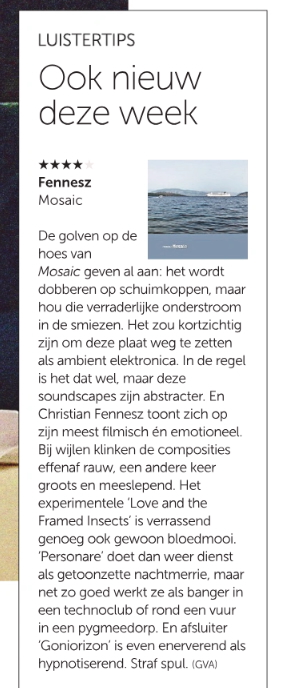
salt peanuts* (SE):
Viennese sound artist-guitarist Christian Fennesz worked on Mosaic in a ‘9 to 5’ routine in his new Seven Fountains studio space in Vienna but with no immediate concept. He got up early in the morning, worked until midday, took a break, and worked again until evening. Ideas morphed into experimental, improvised themes, sculpted and gravitated into layered compositions, and were tightened and corrected during the mixing process.
The title reflects this intense, working process of putting an element into place one at a time, just like ancient art that takes its time to build a full picture. The cover photo by Jon Wozencroft intensifies this reflective dimension and references the cover artwork of the masterful Venice (Touch, 2004 and 2024), but the division between the land, the horizon, and the deep blue sea is more extreme.
Mosaic follows the last studio album, Agora, which was released five years ago. Fennesz completed the work on Mosaic between January and May 2024. It is a most beautiful, highly immersive, dream-like listening experience. It suggests a nuanced but symphonic web of cinematic-kaleidoscopic sounds – including subtle, seductive noises, and colors, openly emotional but in an understated manner, and orchestrated in an enigmatic, left-off-center way.
Fennesz experiments with subtle, unusual time signatures and borrows ideas from surprising sources. «Love and the Framed Insects» surfs on an elusive, atmospheric 7/4 pulse. «Personare» transforms West African pop music from the 1980s into Fennesz’s idiosyncratic sonic universe. The closing piece «Goniorizon» was based on six hard rock guitar riffs mixed on top of one another, mutated into a resonant, spiraling drone. [Eyal Hareuveni]
Pitchfork (USA) by Daniel Bromfield
Hearfeel (UK) by Chris
Dommune (JP)
(ChatGPT translate:
The sea, the sea again. Starting with “Endless Summer” (2001), which is said to have been inspired by surfer movies, the water city “Venice” (2004), and the gloomy “Black Sea” (2008), the previous work “Agora” (2019), and this work “Mo “Zyck”… The Austrian guitarist and laptop player has created works related to the sea so far, and the artwork often uses photos of the sea.
Well, let’s look back first. It was almost 30 years ago. Christian Fennesz dares to say this – appeared before us as one of the representatives of glitch music in “post-outeka/post-electronica/post-ambient”. This style, which is a palette of sound particles generated by the wrong use of technology, cannot be a song without the pleasure of texture and the imagination of the author. Fennesz is one of the few who can independently develop it into a deep expression.
In addition, he studied music at an art school, and the main figure of the Eurocentric electronics experimental site based in a small community in Vienna in the late 1990s – a label called <Mego> by Peter Rehburg (commonly known as Pita) Even if you do, it will be known. In other words, a group that left the British Electronica Typhoon and found Europe’s own circuit, which was neither academia nor techno, was Jim O’Rourke, or veterans Keith Lowe, Burkhard Stangl. The una improvisers also joined. In this frontier (alternative), it is well known here in Japan that Fennesz and the wanderer David Sylvian co-starred and co-worked with Ryuichi Sakamoto.
Improvised works by laptop ensembles with Pita and O’Rourke are still well-rooted in popularity, but most of his early works are made using guitar and effects. The set is still his main equipment, and his acoustic work, which can be compared to sculpture, is structurally different from many electronic music, not to mention having drums and basses. And after all, he has a rediscovery of a melody that is not found in numerous dissonance works, and whether he accepts it or not, the music is full of European aesthetics, e. I think so. It is an exaggeration to say that listening to Fennesz is close to reading Goethe or Thomas Mann, but it is true that his music has poetic beauty, a conflict of living, and inner depth. However, what I always admire when I listen to Fennesz’s music is its mixed expressiveness and boldness. Just as Rothko’s abstract paintings look different depending on the distance you see and the mental state at the time of appreciation, Fennesz’s abstract music can also be heard differently every time you listen to it.
This work “Mosaic”, for Fennesz’s first album in 5 years, is a masterpiece that blends poetic depiction and spirituality drawn with its fine touch. Easier to get into than the previous work. In fact, the “Heliconia” at the beginning of the album has a bright opening. After listening for tens of seconds, it seems that the sea (such as the Adriatic Sea) spreads out in front of you. There are countless textures in the sea. There is light and darkness, and gravity and time change. The circulation of the undulating sound, the sparkle of the sound, and the multiple layers running side by side, a Fennesz-like melody stands up. In Response To The Fascinating Sound Work, The Second Song “Love And The Framed Insects” Drone Starts Statically And Unfolds Introspectively. The sound processed into an ether is flickering, and on the other hand, a creaky glitch sounds beyond the distant memory. The feeling of slowing down in this song can also be felt in the next “Personare”, but this is abstracted in a more duby reverberation.
Fennesz, who released an album like “Endless Summer”, is in an unfortunate situation in a sense that all of his subsequent works are compared to his masterpieces. How many times have I heard the phrase “I like “Endless Summer”, but…” from people called Japanese ambient writers? However, it can be said that there are many ambient writers who have a representative work that is said to be so, but aside from that, it is true that the scene of the west coast of California had an idyllicity that many people could empathise with. However, the scene of the sea is not always golden. In the 4th song “A Man Outside”, there is a cold cloudy sky spreading, and it is a song that seems like that. It’s probably raining somewhere in this song, which is more minimalistic and continues to the vast ocean. “The only thing in the sea is waves” (Nakahara Nakaya) – that’s how it is.
The never-ending summer is coming to an end. The 5th song “Patterning Heart”, which begins while being guided by a drone with a mysterious sound, is also a moving work. Andrei Tarkovsky is a film director who is still favoured by many electronic musicians, and it can be said that it is a suitable song for the video, and I felt the resonance with Ryuichi Sakamoto’s “async” in its weight. However, I don’t know what to say about the solemnity of the mysterious song name “Goniorizon” at the end of the album. Whether it’s a good metaphor to jump into the sea and move towards philosophical introspection. There is a magic power that penetrates the hearts of people who listen to it so much. In any case, the beauty will never be forgotten, deep European music. And the sea, once again.
(Postscript: Mr. Yorosuzu’s explanation of the Japanese version was very instructive. It does not overlap with what is written here at all. Fans are recommended to read it)
Rockdeluxe (Spain):
En el año del vigésimo aniversario de “Venice” “Venice” “Venice” “Venice” (1994), el trabajo más recordado de Fennesz, lejos de dormirse en los laureles el austriaco empezó a trabajar con “Mosaic” “Mosaic” “Mosaic” “Mosaic”, otro disco acuático según la visión habitual de Jon Wozencroft sobre la obra de su amigo. Este artista gráfico puede considerarse el segundo miembro oficioso del proyecto – a lo Peter Saville/New Order– como autor de las portadas de sus discos para Touch –del que es fundador–. Por otro lado, “Mosaico” es un término aplicable al arte o la biología, que implica la coexistencia de pequeñas partes –teselas, manchas, células– relacionadas entre sí, pero diversas en apariencia y contenido. Aplicado a la música de Fennesz, ese mosaico de decisiones acaba configurándose en la fase de mezcla, que el vienés considera parte esencial del proceso compositivo –siempre asume ambas tareas–, momento en el que las piezas van adoptando su forma definitiva mediante cambios y experimentación.
Se trata de una idea escultórica de la música también aplicable a otras disciplinas como la escritura o el cine. Fennesz ha mostrado en alguna entrevista su actual interés por los ritmos africanos, lo que supondría una vuelta a los orígenes no de su carrera –Maische era una banda de post-rock–, sino de la música misma, si no fuese porque “Mosaic” apenas aclara esa influencia, ni siquiera en “Personare” –señalada por el autor–, con resultados más inquietantes que polirrítmicos. A cambio puede ser la pieza más potente del disco, no muy lejos, en su capacidad de atracción, de “Love And The Framed Insects”, corte de inusual compás 7/4, pero uno de los más melódicos (y melancólicos) del álbum, faceta proveniente del gusto confeso de Fennesz por el pop. Y hablamos de Adriano Celentano –de quien asegura poseer un autógrafo– o The Cure. El disco no ha contado con adelantos aunque existe un tema suelto publicado el pasado mes de mayo, “Sognato di domani”, no incluido en “Mosaic” al alinearse mejor con el Fennesz de las ambientaciones saturadas. No se percibe un cambio de tercio radical como en “Bécs” “Bécs” “Bécs” “Bécs” (2014), pero temas como “Goniorizon” contienen sonoridades más cristalinas. La fábrica del corte es la superposición de seis riffs – término pendiente para la insigne RAE, que sí recoge ostinato– de guitarras de rock duro creando una red de texturas solapadas que recuerdan al “(No Pussyfooting)” (1973), de Fripp & Eno, mostrando con ello la ductilidad de la música en general y de los tratamientos electrónicos en particular. Junto a la anterior, “Heliconia” es la pista más larga –nueve minutos–, acuátil –para regocijo de Wozencroft– y reconociblemente guitarrística de “Mosaic”, especialmente en su segunda mitad, con la misma sonoridad que recabó David Sylvian, colaborador puntual de Fennesz, para su álbum “Blemish” (2006). Guitarras y pedales siguen siendo las herramientas principales, junto al laptop. No en vano, el austriaco se pagó la universidad tocando polcas en bodorrios. “Mosaic” es, de nuevo, uno de esos álbumes mágicos, liminales o entre dos mundos tan característicos de Fennesz, con alguna incorporaciones estilísticas sutiles pero patentes, aunque solo sea en cuestión de variedad de paisajes, menos abstracto –o más accesible, como una banda sonora– que trabajos anteriores, también con espacio para respirar, aunque sea bajo el agua, y la excepción de la envolvente “Patterning” , que te invita a surfear sobre sus olas sinusoidales –como Harold Budd y Cocteau Twins en “The Moon And The Melodies” (1986)–, ajeno a todo lo que se hace por ahí –pipiolos como KMRU o Ulla seguramente le deban una ronda–, basándose, como siempre, en la improvisación y en la investigación con corazón. [José Manuel Caturla]
Arcana review by Ben Hogwood [UK]











